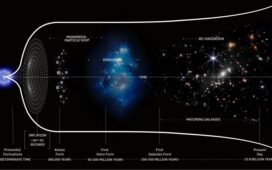As the Universe ages, it continues to gravitate, form stars, and expand. And yet, all this will someday end. Do we finally understand how?
Going all the way back to ancient times — sometimes attributed to Persia, other times to King Solomon, and still at other times to far eastern sources — one of the most important reminders of the transient nature of all things, good and bad, is encapsulated in the simple saying, “this too shall pass.” Both joy and sorrow are temporary, as is life itself. The stars, shining brightly throughout the sky, will all someday burn out; the galaxies will someday turn dark. Even if the timescales for some of these phenomena are barely fathomable to the human mind, the fact remains that everything within the Universe, and even the Universe itself, will someday cease to exist as we know it.
But has science truly learned enough to declare what the nature of our ultimate cosmic demise will be? Can we speak confidently about when that demise will occur? And is there wiggle room for an alternative outcome; is what we think we know today only provisional, and what sort of evidence could change our minds? That’s what Kyle Brewer wants to know, writing in to succinctly ask:
“What does the most current…















